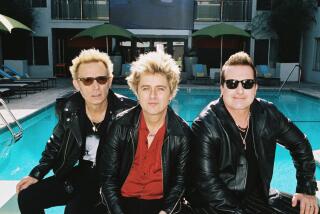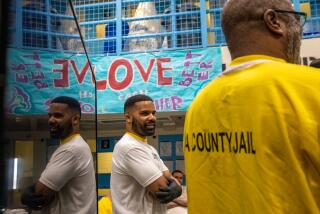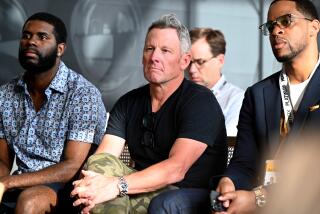Armstrong’s Superb Effort Brings Cycling to Forefront
- Share via
American cyclist Lance Armstrong says he isn’t a drug cheat. He damn well better not be. If Armstrong, the cancer survivor turned soon-to-be three-time Tour de France champion, has been lying for three years, it would instantly turn him from one of the most inspirational stories in sports history to a pariah.
It would mean he’s been lying to all the people who look to him as a beacon in their own fights against terminal illness. He’d be an even bigger fraud than Ben Johnson, the Canadian sprinter who immediately comes to mind now as Armstrong defends his association with a doctor who’s been suspected of wrongdoing long before authorities could prove it.
Back in 1987 and ‘88, Johnson owned the world record in the 100-meter dash and brayed about his innocence until he tested positive for the steroid stanozolol at the Seoul Olympics and his medic, Jamie Astaphan, eventually confessed he supplied Johnson with the drug.
But for Armstrong, even more than Johnson, resorting to something like EPO, or erythropoetin, a performance-enhancing drug, would be an act of lunacy. Surveys over the years have repeatedly shown that many world-class athletes say if they could take something that would guarantee them a gold medal--but might kill them--hey’d take it anyway. But those athletes are always speaking of the hypothetical when it comes to dying young.
Not Armstrong.
“Something like human growth hormone, you think someone with my health history would take something like that?” he said at a packed news conference Monday. “There’s no way.”
He’d better not be. Barring a catastrophe during the few stages left on the way to Paris, Armstrong’s amazing performance in the mountain stages, the most grueling part of the 20-day, 2,159-mile race, will have won him his third straight title, a remarkable feat that only four other men have managed. He hasn’t just dominated the race this year as never before, he’s shattered the other competitors’ spirits. You could argue that pound for pound, Armstrong is the toughest guy in sports. He’s made people care about cycling the way Tiger Woods has done with golf.
How Armstrong has been able to win despite his health history is worth recapping.
The gruesome details appear in “It’s Not About the Bike: My Journey Back to Life,” the extraordinary book that Armstrong wrote two years ago with Sally Jenkins. By the time Armstrong was diagnosed in October 1996 at age 26, his cancer had spread so aggressively that his doctors gave him no better than a 40-percent chance to survive. He had a large tumor in one testicle and a dozen tumors in his lungs, some of them the size of golf balls. A week later, doctors found two lesions in his brain. Then they reached for their scalpels.
Armstrong has a surgical scar from his groin to his upper thigh. He has two deep, half-moon scars in his scalp from brain surgery. He still has a puckered wound above his heart where the catheter for his three months of chemotherapy was implanted. “I still don’t know why I’m alive,” he once said.
Just reading it is gut-wrenching stuff. So imagine living through the body-wasting horror of Armstrong’s chemo treatments. The “terror” of the year he spent pondering his own death. He characterized his first comeback attempt in ’97 a “disaster.” During a lashing rainstorm he pulled his bike to the side of a French road in mid-race and actually said “I quit”--two words that are never associated with him today. For months afterward, Armstrong did nothing.
He said what yanked him out of his despair was a straight-talking conversation with his fiance, Kristin Richard. They’ve married, had a son, and are expecting twin girls in December.
Armstrong said he’s happier than he’s ever been. He said the drug suspicions swirling around him now because of the 1998 drug scandal that rocked the tour and, more recently, a Times of London article on the eve of this year’s race, are untrue.
But the meticulously reported Times article certainly raised some troubling questions. Like? A fellow cyclist who is suing U.S. Cycling said Armstrong’s current coach, Chris Carmichael, pushed him to take injections years ago. And investigators have records showing Armstrong has paid five visits since March 1999 to Michele Ferrari, an Italian doctor scheduled to go on trial in September on charges of providing EPO to cyclists. Armstrong’s most recent visit to Ferrari was this spring.
After steadfastly describing Ferrari as an important part of his team, Armstrong finally backpedaled a bit Monday and said he still believes Ferrari is innocent, but some people might find their working relationship “questionable.” Armstrong promised he would re-evaluate everything after Ferrari’s trial. He also stressed that he’s never flunked a drug test.
“I’m the cleanest of clean riders,” Armstrong insists.
He’d better be. His racing results are so otherworldly right now it’s spurring the drug talk along. But Armstrong deserves to be believed until proven otherwise. Not because he tests clean (EPO users routinely beat the tests) but because lying about this, given the special constituency he has, would be unconscionable.
More to Read
Go beyond the scoreboard
Get the latest on L.A.'s teams in the daily Sports Report newsletter.
You may occasionally receive promotional content from the Los Angeles Times.






